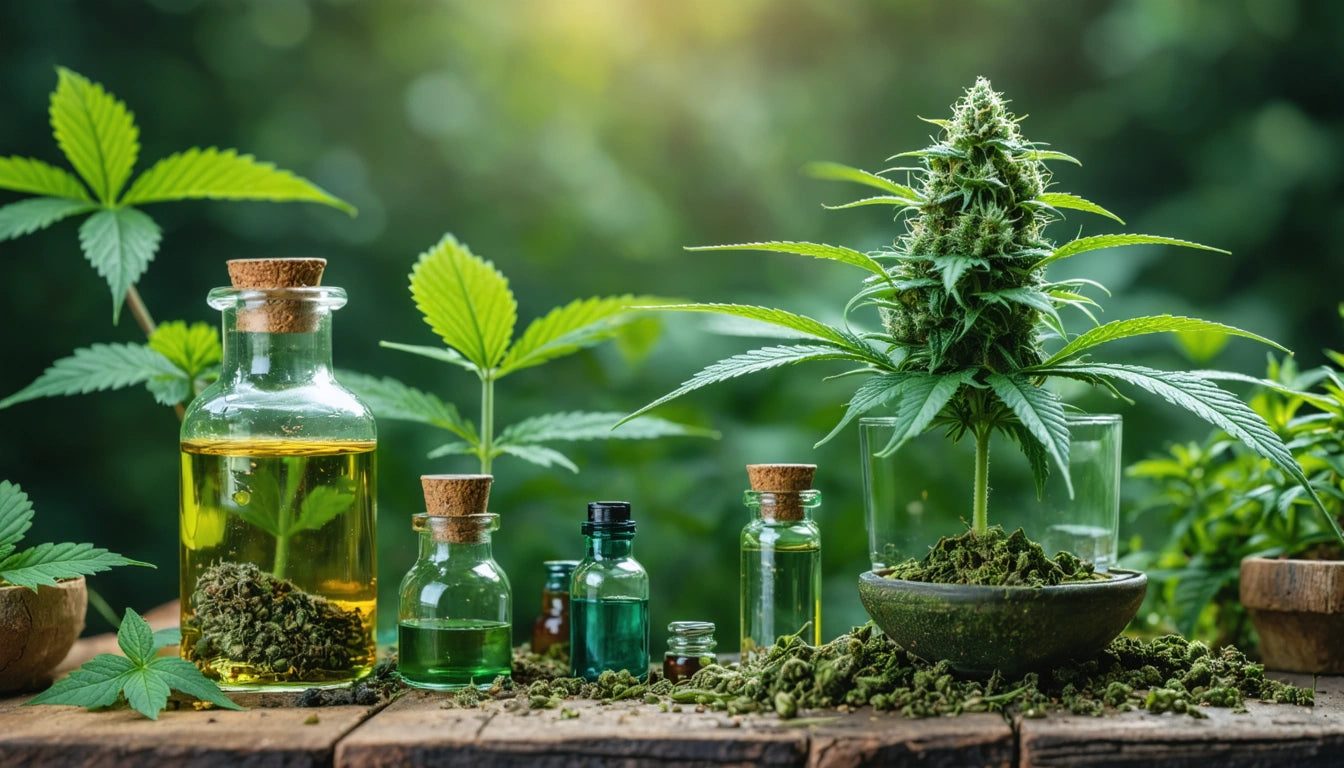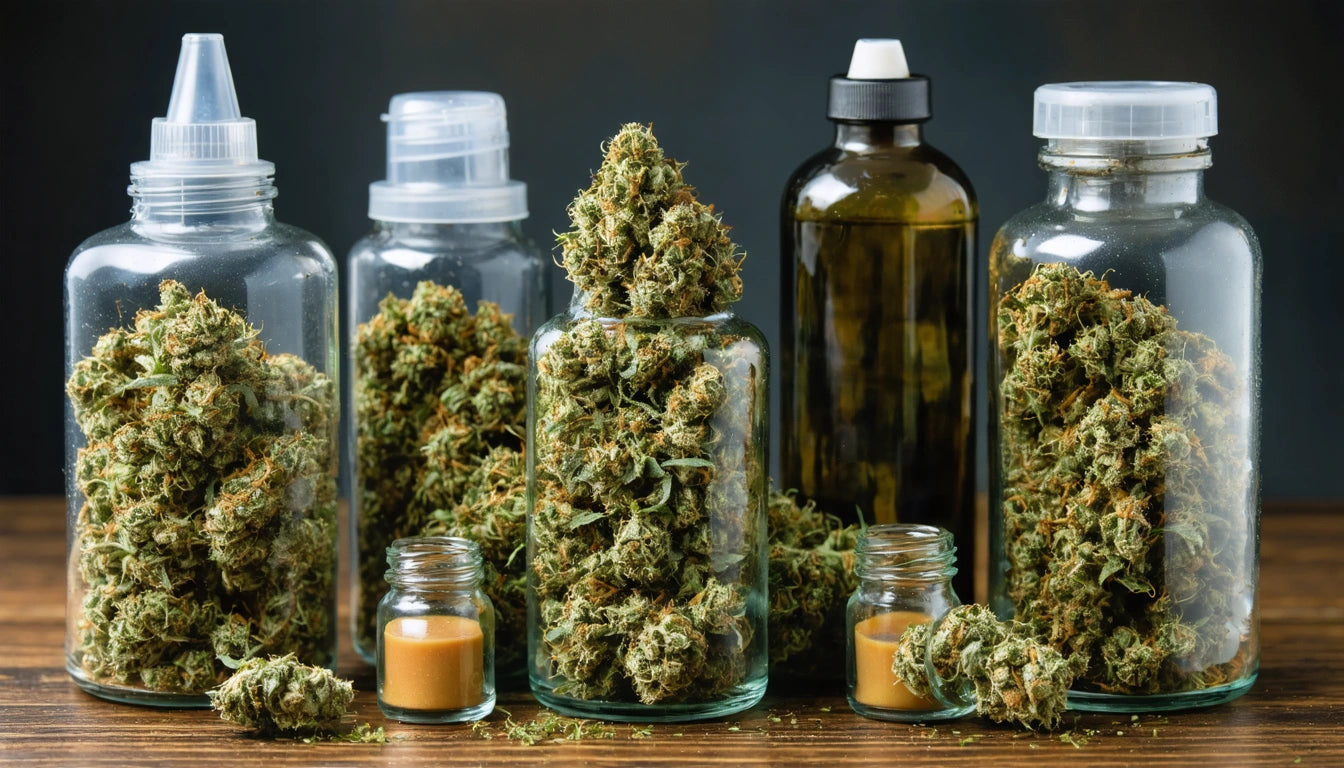Table of Contents
Understanding the Production and Creation of THC and THC Oil
THC (tetrahydrocannabinol) is the primary psychoactive compound in cannabis that creates the characteristic "high" associated with marijuana consumption. Understanding how THC is made involves exploring both natural biological processes within the cannabis plant and human extraction techniques used to create concentrated THC products. This comprehensive guide examines how THC is produced naturally and how THC oil is made through various extraction methods.
Natural THC Production in Cannabis Plants
Cannabis plants don't directly produce THC in significant quantities. Instead, they synthesize THCA (tetrahydrocannabinolic acid), the non-psychoactive precursor to THC. This biosynthesis occurs within specialized glandular structures called trichomes, which appear as tiny crystal-like formations on the flowers, leaves, and stems of the plant.
The production pathway begins with the cannabis plant creating cannabigerolic acid (CBGA), often referred to as the "mother cannabinoid." Through enzymatic processes, CBGA is converted to THCA by the plant. This conversion is regulated by the plant's genetics, growing conditions, and maturation stage.
As detailed in this guide on THC and THCA differences, the raw cannabis plant contains minimal active THC. Instead, it's rich in THCA, which must undergo a transformation to become psychoactive THC.
THCA to THC Conversion: The Decarboxylation Process
The conversion of THCA to THC occurs through a chemical process called decarboxylation. This process involves removing a carboxyl group (COOH) from the THCA molecule, releasing carbon dioxide (COâ‚‚) and transforming the compound into THC.
Decarboxylation can happen in several ways:
- Heat application (smoking, vaping, or baking)
- Extended exposure to light
- Natural aging of the plant material
Heat is the most efficient catalyst for this conversion, which is why smoking or vaping cannabis produces immediate psychoactive effects. When cannabis is heated to approximately 220-245 °F (105-118 °C), THCA rapidly converts to THC.
For producers creating THC-infused edibles and beverages, proper decarboxylation is a critical first step to ensure the final product contains active THC rather than non-psychoactive THCA.
THC Oil Extraction Methods: From Plant to Concentrate
Creating THC oil involves extracting cannabinoids from plant material and concentrating them into a potent oil form. Several methods are used in both commercial and home settings:
Solvent-Based Extraction
Solvent extraction uses chemicals like butane, propane, ethanol, or COâ‚‚ to separate cannabinoids from plant material:
- Hydrocarbon extraction (using butane or propane) creates highly potent extracts but requires professional equipment for safety.
- Ethanol extraction is considered safer and can be scaled for commercial production.
- COâ‚‚ extraction uses pressurized carbon dioxide to pull cannabinoids from plant material, producing clean extracts without toxic residues.
These methods require specialized equipment and technical knowledge, as outlined in this comprehensive guide to extracting THC concentrates.
Solventless Extraction
Solventless methods avoid chemical solvents entirely:
- Rosin press technique uses heat and pressure to squeeze resinous sap from plant material.
- Ice water extraction separates trichomes from plant material using cold water and filtration.
- Dry sift method uses fine screens to physically separate trichomes.
For initial processing, many producers rely on quality grinding equipment to prepare cannabis material for extraction, ensuring consistent particle size and maximizing surface area for efficient processing.
Commercial Production Techniques and Equipment
Commercial THC production has evolved into a sophisticated industry with specialized equipment and techniques:
Cultivation Optimization
Commercial growers carefully control environmental factors to maximize THCA production in plants:
- Light spectrum and intensity adjustments
- Temperature and humidity control
- Nutrient formulations specific to cannabinoid production
- Harvest timing to peak THCA levels
Industrial Extraction
Large-scale operations use advanced equipment for extraction:
- Closed-loop extraction systems for safety and efficiency
- Rotary evaporators for solvent recovery
- Winterization equipment to remove waxes and lipids
- Short-path distillation apparatus for high-purity THC distillate
These industrial processes can produce THC distillate with purity levels exceeding 90%, making it one of the most potent forms of THC available.
Quality Control and Testing in THC Production
Quality control is essential in THC production to ensure safety and consistency:
Testing Parameters
Professional laboratories test THC products for:
- Potency (THC percentage)
- Terpene profiles
- Residual solvents
- Pesticides and heavy metals
- Microbial contaminants
Understanding THC potency is crucial for both producers and consumers, as it determines dosage and effects.
Regulatory Compliance
Licensed producers must adhere to strict regulations regarding:
- Production methods
- Testing requirements
- Labeling standards
- Storage protocols
These standards ensure that commercially produced THC products are safe and accurately represented to consumers.
Future Innovations in THC Production Technology
The cannabis industry continues to evolve with new technologies for THC production:
- Biosynthesis of cannabinoids using yeast or bacteria
- Automated extraction systems with AI optimization
- Pharmaceutical-grade production facilities
- Targeted cannabinoid isolation techniques
These advancements may soon make it possible to produce specific cannabinoids without growing cannabis plants, potentially revolutionizing how THC is made and how THC oil is produced.
Understanding the science behind THC as the key component in cannabis helps both producers and consumers make informed decisions about cannabis products and their applications.











Leave a comment
All comments are moderated before being published.
This site is protected by hCaptcha and the hCaptcha Privacy Policy and Terms of Service apply.